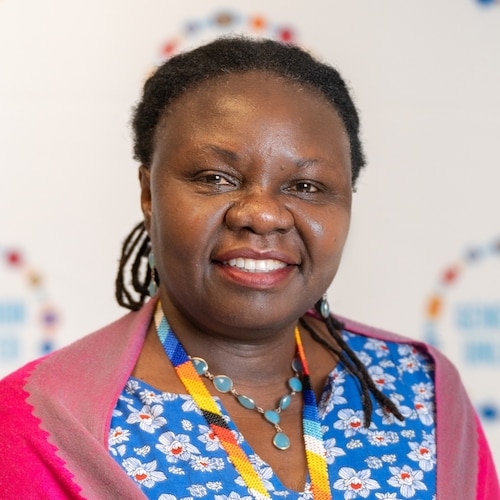{{item.title}}
{{item.text}}

{{item.text}}
Take on Tomorrow, the award-winning podcast from our management publication strategy+business, brings you Episode 10: “How can we ensure the workers of tomorrow get the skills they need today?”
As countries around the world face labour shortages, global youth unemployment is growing. Many people between the ages of 15 and 24 are struggling to find the skills they’ll need in the workplace. Businesses have to think about the workforce of the future and start developing the necessary talent today within their own workplace. In this episode, we discuss how businesses can give people the skills to succeed in today’s economy, and to be leaders in tomorrow’s.
Lizzie O’Leary
Podcaster and journalist
Ayesha Hazarika
Columnist and former senior political advisor
Nadi Albino
Deputy Director for Partnerships, Generation Unlimited
Chaitali Mukherjee
Partner & Leader, People and Organisation, PwC India
2023 Shorty award winner for "Best Branded Podcast" series
2023 Webby award nominee for "Best Podcast" series
{{item.text}}

{{item.text}}
As reinvention pressure rises, CEOs need to rewire their decision-making.
Sharp, actionable insights curated to help global leaders build trust and deliver sustained outcomes. Explore our latest content on the global issues affecting organisations today from ESG to value creation, technology and cyber to workforce transformation.
Nadi Albino: Jobs are rapidly changing. Some of the jobs that we have now will be obsolete, and there will be new kinds of jobs with new kinds of skills.
Chaitali Mukherjee: The organizations that are investing in being future-focused from a skills perspective, they’re automatically almost becoming talent magnets.
Nadi: The private sector has to be at the table. If they’re not at a table, you cannot give the kind of skills that they need in the jobs that they are creating for the young people to be able to take up.
Ayesha Hazarika: From PwC’s management publication strategy and business, this is Take on Tomorrow, the podcast that brings together experts from around the globe to figure out what business could and should be doing to tackle some of the biggest issues we face.
I’m Ayesha Hazarika, a broadcaster and former senior political advisor in London.
Lizzie O’Leary: And I’m Lizzie O’Leary, a podcaster and journalist in New York.
Today’s episode is about the future of our workforce. Many young people today—and by young we mean those between 15 and 24 years of age—struggle to access the skills they need to succeed in the workplace.
How can we make sure young adults develop the skills they need to succeed? And how can companies pave the way for students and other young people to join their businesses?
Ayesha: To answer those questions, we talk to Nadi Albino, who we heard at the start. She’s deputy director of partnerships at Generation Unlimited, a global public–private–youth partnership kickstarted by the United Nations. Generation Unlimited exists to help connect the world’s young people to opportunities of employment and entrepreneurship, so who better to talk to about the distinct challenges this generation of young people face, the implication for labour markets, and the role of business in closing those gaps?
Lizzie: But first, we’re joined by Chaitali Mukherjee, the people and organization lead partner with PwC India. Hello, Chaitali, and welcome.
Chaitali: Hello!
Lizzie: I wonder if you could explain what you do in your role. How are you getting your clients and their employees ready for the future?
Chaitali: Thanks, Lizzie. It’s basically helping organizations and leadership think a little more into the future, and get them to think about talent in that context, and how can they get their organizations ready for the workplaces of the future.
Ayesha: In your view, what’s more of a pressing issue, Chaitali, the future of the workplace or the future of the workforce?
Chaitali: I very strongly believe that organizations are workforces for the people, by the people, of the people. So clearly workforce. A workplace is of no value if there is no workforce ready to join us in there.
Lizzie: I think I would love to hear you articulate why businesses should really care about the skills that young people should have before they enter the workforce and whether they’re getting those skills. Do you see problems in that area right now?
Chaitali: Lizzie, this is a huge problem. Every organization that you would speak to—and this has come up in the global CEO surveys of PwC—at least for the last five years, organizations are wanting to do everything that is new and different from what they have been doing in the past. Their strategy is all about differentiation. Their strategy is all about doing things that others aren’t doing.
Guess what? Who’s going to do that for you? It’s your workforce. So how do you actually execute a unique strategy, a strategy of differentiation, if you don’t have talent which has the skills for the future, which are unique, which are new, and which are different?
Ayesha: What are the actual skills that employers are actually looking for?
Chaitali: It would basically start from cognitive ability, analytical skills, but analytics with ability to create insights. Along with that, also be empathetic. Digital capabilities, mindset, resilience, and, of course, attitude towards good work.
Lizzie: Chaitali, we are going to come back to you to dig deeper into this. But, Ayesha, you also spoke to Nadi Albino, deputy director of partnerships at Generation Unlimited.
Ayesha: That’s right. She works on building partnerships between the corporate sector, governments, and young people. And she made it clear that young people are the future of the workplace. Here’s how she explained what Generation Unlimited does.
Nadi: It’s an extremely exciting program. We want to work with the 1.8 billion young people today, the largest cohort of young people ever in history, to connect them to opportunities. And we’ve narrowed that down to basically saying, “How can we give young people the right skills that would help them to navigate today’s world and tomorrow’s world? And to be the leaders of today and tomorrow that we expect them to be—and address all the challenges that we see in the world today?”
Ayesha: Do you have any success stories that you can share with us?
Nadi: A number of success stories that I could talk about, really extremely exciting: a young 26-year-old girl, in Kenya, who had graduated from an agriculture technical college, but didn’t actually understand the business side of agriculture, and went through this program that we are working with in Kenya.
And now she is like an extension worker, working with about 500 farmers and linking them to the markets across the value chains, through logistics, where the markets are, using technology to help them predict climate issues, linking them to cottage industries or processing plants where their produce can be processed. And, the farmers that she has been working with have actually improved their yield two-, threefold. They are, increased their annual income, and are able to support their families better.
So, it really contributes to a circular economy within that community, because it addresses a number of things. It focuses on issues of climate, environment, protecting that—it’s regenerative agriculture. And it’s creating a number of jobs across the value chains in logistics, in the mushrooming of cottage industries.
Ayesha: I’m really struck by your passion for this. And, like, I can hear the, the enthusiasm you have, and—
Ayesha: —and the excitement you have for this work. I mean, tell us a bit about your backstory. What made you want to get involved with skills and helping young people?
Nadi: Because it’s really a story of my own personal journey. So, I was born in South Sudan, of South Sudanese parents. And we had to leave when I was really very little because of war. And I grew up in Kenya, starting my life off as a refugee, and the opportunities that were available—for me to be able to go to school, for me to be able to get skilling opportunities. I got scholarships. I studied abroad. I went back home.
I was able to hone my skills even further, because I believe that whatever it is, I learn everywhere; I needed to take it back home. My first job after graduating was with UNICEF, and my focus then was on children. Fast-forward a few years down the line, I was transferred to South Africa.
UNICEF’s focus really was on early childhood and the first decade, but when I went to South Africa, it was a much more advanced government. It was a middle-income country. The way we had to operate there was a little bit different. And I noted that the challenges were by and large within the second decade and getting young people situated in work. And one of the things that we realized was the school curriculum wasn’t quite helpful in getting young people to get the kind of skills that they needed.
So, the first program we actually started, because I’m female and I love to give opportunities to women, focused on STEM subjects, because only 14% of women were within the STEM sector in South Africa. And we started this program called Technogirls, got young women into mentoring and coaching opportunities with the corporate sector. So, it was a public–private partnership. And this program has grown massively to today, it still exists in South Africa. And, if you reach out to South Africa, you will hear phenomenal stories of girls who have gone through that program.
Ayesha: And in terms of your dealings with business, and I suppose your message to business and the private sector, what happens to the job force and the labour market if businesses don’t play their part in skilling up young people? Because, if there is a shortage of skills, then that’s really going to affect people’s businesses down the track.
Nadi: We are in quite deep conversations, and also begin to have some action, with PricewaterhouseCoopers and Unilever and SAP, using a platform that we have called Yoma, which is the Youth Market Agency, of how we bring young people on board, move them to the various skilling opportunities that exist.
And then these companies have specifically customized, designed courses that help young people to get either onto SAP jobs or Unilever jobs, et cetera. Now, they cannot guarantee that they’re going to employ hundreds, or tens of thousands, but at least we are creating an opportunity for young people to have the skills from some of these big tech companies and some of these big consulting and accounting companies where, actually, the skills lie and where the mismatch is.
So, if private sector is not involved with the governments in ensuring what are the kind of skills that are needed as part of curriculums, then you see what we are seeing in the job market now, where there’s a massive mismatch of skills. The private sector has to be at the table. If they’re not at a table, you cannot give the kind of skills that they need in the jobs that they are creating for the young people to be able to take up.
Ayesha: And you just mentioned that Generation Unlimited collaborates and works with a number of different organizations from the private sector. I wondered if you could tell us a bit about the work you’re doing with PwC?
Nadi: So, with PwC we do two really very interesting programs. One in India, building this digital platform that’s going to reach about 300 million young people with the new skills—whether it’s being upskilled, whether it’s reskilling of young people with the different states in India and linking young people to opportunities for jobs. But, also for those who would like to go into entrepreneurship, how do you link them to the entrepreneurial skills that they will need, and microfinancing opportunities to start out or impact financing or venture capitalism or loans, et cetera, as the case might be?
Similarly, in South Africa, PwC is supporting the Technogirl program that I talked about earlier on. And also, a platform that they call YoMobi, which is a platform that is also going to be bringing together different partners, different content, skilling young people, linking them to the Yoma platform that I talked about earlier on. So, we are looking at, by 2030, at least half a million young people having gone through the support that we are getting from PricewaterhouseCoopers, and we’re bringing other partners on board.
Ayesha: It’s really interesting, what you say about the speed at which skills are changing and evolving, and how lots of old skills are becoming obsolete. How can the private sector feed in and make sure that the skills they need are the ones that are being focused on and that there is adequate provision there to keep young people up to date with skills?
Nadi: It’s very important that the private sector is able to define the skills that they anticipate they will be needing in the next year, in the next two years, if they can go that far. And to say, then work with the right institutions to be able to develop those necessary courses. At Generation Unlimited, we are open to working with all partners who would like to work with us in terms of curating, designing those skills.
Ayesha: And final question to you, with all your experience, your own lived experience, your professional experience: if you could pick two things surrounding young people and skills in the workplace that needs to be addressed by private sector, corporations, and business leaders, what would those two things be?
Nadi: First, I think that business leaders need to understand that there are five different generations in the workplace today. From your Silent Generation from 1945, to your Gen Z from 1997. So, you’re talking about generations that are hardworking and studious to generations that are digital natives and work smart. And we really want to achieve a better world. So I think it’s really very important that corporates focus on the S in ESG, much more effectively, and governance, sustainability, should be a big aspect of it.
The other area is really voice and agency, are they listening? Are the corporates really listening to what the youth are saying about today’s world, and are they taking that on board, and are they taking action to address some of those challenges that are being raised?
Ayesha: Nadi, it’s been such a pleasure speaking to you, hearing your expertise and your experiences. Thank you for talking to us on Take on Tomorrow.
Nadi: Thank you, Ayesha. Looking forward to taking on tomorrow, not just in words, but in deeds.
Lizzie: Nadi Albino there, talking to Ayesha. Chaitali Mukherjee, the people and organization lead partner with PwC India is back here with us to dig into that conversation now.
Ayesha: Nadi talked about the importance of businesses partnering with the public sector and other stakeholders to identify gaps and skills needs. In your experience, how much appetite does business really have for that way of working?
Chaitali: It’s not about how much appetite businesses have. It is, do businesses have a choice? They need specific skills. All organizations have, actually, as part of their strategy, tried to create very unique processes. You are not going to get that capability outside in the marketplace. You will have to build it yourself. I think the big challenge is that the nature of problems have changed. So organizations need very complex capabilities and skills.
Nobody’s building that. So they have only two options. They could keep waiting for somebody else to do it, or they do it on their own. And for you to do it on your own, it’s of no use if you just do it for yourself. The whole ecosystem needs to actually come at the same level of competence. So my suppliers, if they don’t have the skills, they will not be able to deliver. If my suppliers can’t deliver, I can’t deliver. So do we have an appetite or choice? The answer is absolutely simple. There is no choice.
Lizzie: I wonder, Chaitali, what makes it harder for businesses to, to engage in this way? You know, are there things that the public sector could do to better improve collaboration? And think about how to identify those skills that young people need to find meaningful work?
Chaitali: The role that public and private sector needs to play together on this one is very simple, yet not very simple. It’s simple because the education at the base level is extremely archaic. I’ll give you an example. Our education system today teaches you about a lot of things that have happened in the past in most of the countries, but it is yet not teaching people absolutely basic skills like financial management.
Whether I am a 15-year-old, whether I’m a 17-year-old, whether I’m a 24-year-old, we all need to know how to manage money and manage finances. Some of these life skills are actually not taught to the youngsters. For the youngsters, the focus has to be on the right balance between skill for knowledge, as well as employment. And employment is having life skills. And, I think, that to me is the role that the government will have to play in defining what common minimum level the government will have to set.
Ayesha: Do you think there is enough discussion between government and education, policymakers, and business as well? Because it’s not a very valued part of the education syllabus.
Chaitali: I think the challenge is not about whether it’s getting discussed. It’s about the awareness and the realization of the urgency required around it. But the connected thinking, the connected implementation of the thought, I think needs far more rigor and speed, according to me.
Lizzie: Well, a more traditional approach would be sort of for businesses to sit and wait, right? To be passive and let an educational system churn out people into the labour market with skills, hire them, and see where that goes? And it sounds like you’re saying that that passive approach just can’t work in today’s economy.
Chaitali: Let’s imagine it this way: I hire, say, about 2,000 people, and I hire those people at a certain level of competence. And then, when I bring them to my organization, I realize, oh, they have no skills. So they will now take another year on your rolls, at your cost, to get trained.
So that passive approach is only making the cost of skilling higher and higher and higher. In fact, most organizations these days, at least in India, Lizzie, are very articulate about it. They’re tying up with educational institutes right at the start of the undergrad degree so that they can work with them all through. And with a lot of my clients, I am saying, “Go further down and actually start working with schools,” and I think that is what will actually be required. The complexity and the multi-disciplinarity of the skills that we are seeking for the world of the future cannot be developed passively. It’s a way of thinking. So I think the earlier you go into the journey, the deeper partnerships you do, the better it is for everybody.
Lizzie: What needs to change about businesses in order for them to attract and retain the talent they want, particularly in a strong labour market?
Chaitali: I think the organizations that are investing in making their talent future-ready, the organizations that are investing in being future-focused from a skills perspective, they’re automatically almost becoming talent magnets.
So let’s think: why is it that all employees want to queue up and join some of the startups? It’s because they believe those organizations are going to give them an environment which is independent; and they will learn, work, three years in a year. They will work, but they will also learn. And that learning actually takes you a long way. So I think what would actually help businesses is if they understand this aspect of the workforce and be upfront about how they’re invested in skilling. Because if they do that, they will always be valued.
Ayesha: Chaitali, what about businesses who are trying really hard to fill skills gaps? What works for them?
Chaitali: So, if you are seen and viewed and heard as an organization that is investing in skills of the future, it helps in your brand, number one. Secondly, it helps you in having the differentiating strategy and being able to advance on your strategy, because eventually those skills will be required for you to deliver. So it obviously gives you that edge in comparison to others. And third, most importantly, if everybody’s going to struggle in the absence of skills, you’re the first one who’s going to come out of it, because you are the one who’s making the investment versus others are waiting. The future is about being talent-giver to the world. Because if we are talking about a connected economy, you need ambassadors in all directions.
Ayesha: What do you think are the nonnegotiable skills that young people need to acquire to be employable? And where do we see the biggest gaps in workers entering the labour market?
Chaitali: If I had to choose one nonnegotiable skill that young people need to acquire to be employable, it is attitude. It is basically my desire to go with the flow, my desire to not come across as privileged. My desire to not just stand up and ask for things and not care about what I’m giving in return.
Number two, I think, humility. It’s a very, very important one. And it doesn’t matter what age you are, right? At the end of the day, the reality is humble people are always more welcome. They make places better to work, they make it more inclusive. So if we have workers who are entering the workplaces who are humble, who are supportive, it’ll just make the workplace a better place.
Ayesha: And for those business leaders who want to do more to help young people and to transition young people into their workforce, what advice do you have for those business leaders?
Chaitali: Three things. Think wide and think further. So don’t think just in the moment; be humble, to learn and to give. And third, have patience.
Lizzie: Chaitali Mukherjee, thank you so much for joining us and sharing your wisdom.
Chaitali: Complete pleasure. Thank you so much for the opportunity.
Ayesha: What an interesting interview, Lizzie. I mean, Chaitali’s passion and enthusiasm was really infectious and really persuasive. I mean, my big takeaways, I loved her, just, focus on how the workforce should be for the people, of the people, by the people. Right at the end of the interview, very philosophical words that we could all learn to live with, to sort of think deeply, to be humble, and to be patient. I think it’s probably one of the most philosophical conversations I’ve had about skills.
Lizzie: I think so, too. And I kept thinking I would love for Chaitali to be my boss, because you just get the sense of a generous manager, but also someone who is thinking longitudinally about both workforces, but then also kind of how you’re building an economy that is made up of people. I was also really captivated by how early we should be thinking about skills. That are not just the skills you will have in one workforce, but then you will travel forth and be an ambassador, right? I think that’s something more corporations can think, “What does this mean for my workforce?” But really, it’s what does it mean for the economy, or someone who will be my supplier, my partner, whatever it is? But I found that to be a really generous and forward-thinking way to wrestle with these issues.
Ayesha: That’s it for this episode. Join us next week, when we’ll be asking: how can business benefit from a world on the move?
Guest: I would say, if you’re a country that’s attracting young people, you’re gonna be fine. You’re gonna have taxpayers, innovators, entrepreneurs, homeowners, renters, construction workers, you’re going to have those things. And, if you’re losing people, you’re not going to have those things.
Ayesha: Take on Tomorrow is brought to you by PwC’s strategy and business. PwC refers to the PwC network and/or one or more of its member firms, each of which is a separate legal entity.
© 2022 PwC. All rights reserved. PwC refers to the PwC network and/or one or more of its member firms, each of which is a separate legal entity. Please see www.pwc.com/structure for further details.
This content is for general information purposes only, and should not be used as a substitute for consultation with professional advisors.







